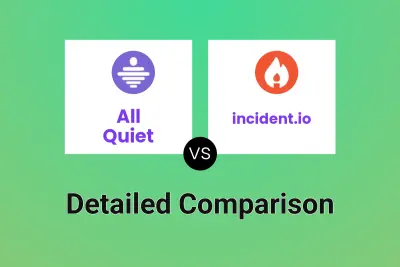 All Quiet
VS
All Quiet
VS
 AlertOps
AlertOps
All Quiet
All Quiet is a comprehensive incident management platform designed specifically for modern tech teams. The platform combines essential features like on-call management, website monitoring, and incident response in an intuitive interface that can be set up within 15 minutes.
The solution offers over 30 built-in integrations, flexible on-call scheduling capabilities, and multiple alert channels including push notifications, SMS, email, and phone calls. With features like status pages, escalation policies, and detailed reporting, All Quiet helps teams maintain operational resilience while keeping their systems running smoothly.
AlertOps
AlertOps empowers businesses with advanced incident management capabilities through AI-powered automation, helping teams respond faster and minimize downtime. The platform integrates with over 200 tools, enabling seamless alert capture, noise reduction, and stakeholder notifications across multiple channels including phone, SMS, and app notifications. Users can customize escalation workflows and on-call schedules, ensuring incidents are routed to the right team members without delay.
Providing rich reporting and analytics, AlertOps helps organizations track performance, generate post-mortem reports, and optimize incident workflows. Its flexible architecture supports enterprise needs, managed service providers, and industries like healthcare, retail, and government. With real-time dashboards, SLA management, and live call routing, AlertOps transforms incident response for modern IT environments.
Pricing
All Quiet Pricing
All Quiet offers Freemium pricing with plans starting from $5 per month .
AlertOps Pricing
AlertOps offers Freemium pricing with plans starting from $8 per month .
Features
All Quiet
- On-Call Management: Flexible scheduling with daily, weekly, monthly rotations
- Integrations: 30+ built-in integrations with major monitoring and collaboration tools
- Alert Channels: Multiple notification options including SMS, voice calls, push notifications, and email
- Status Pages: Real-time incident updates and customer communication
- Website Monitoring: Built-in health monitoring for websites, APIs, and HTTP endpoints
- Developer Tools: Terraform provider and webhook customization support
- Reporting: KPI tracking and operational resilience metrics
- Escalation Management: Automated alert escalation system
AlertOps
- AI Noise Reduction: Automatically filters and consolidates duplicate or low-priority alerts to reduce noise.
- On-Call Scheduling: Advanced, customizable schedules for teams, including escalation rules and follow-the-sun capabilities.
- Multi-Channel Notifications: Sends alerts via phone, SMS, mobile app, chat, and email.
- Over 200 Integrations: Seamlessly connects with monitoring, ITSM, and ChatOps tools.
- Automated Escalation Policies: Customizable workflows that escalate incidents based on rules and SLA requirements.
- Live Call Routing: Routes customer calls to the correct on-call person; includes escalation if unanswered.
- Reporting & Analytics: Real-time dashboards and exportable post-mortem and performance reports.
- Rich Alert Details: Supports enriched alerts with attachments, URLs, and custom messages.
- No-Code Workflow Engine: Create automation actions for alert processing without code.
- Role-Based Security: Advanced permissions and roles for scalable team management.
Use Cases
All Quiet Use Cases
- Team on-call rotation management
- Website and API monitoring
- Incident response automation
- Customer status page communication
- System maintenance scheduling
- Alert routing and escalation
- On-call compensation tracking
- Development team collaboration
AlertOps Use Cases
- Automating IT incident response across distributed teams.
- Managing on-call schedules for IT operations and DevOps.
- Reducing alert fatigue in high-volume monitoring environments.
- Providing real-time status updates to stakeholders during major incidents.
- Integrating with ServiceNow, Slack, and other ITSM or ChatOps platforms.
- Ensuring SLA compliance and automated escalation for managed service providers.
- Enabling live call routing for 24/7 customer support.
- Centralizing incident post-mortem reporting and analytics.
FAQs
All Quiet FAQs
-
How quickly can I set up All Quiet?
All Quiet can be set up within 15 minutes with its lightspeed setup process and built-in integrations. -
What types of alert notifications are supported?
All Quiet supports multiple alert channels including push notifications, SMS, email, phone calls, and integration with collaboration tools like Slack. -
How many integrations are available?
All Quiet offers more than 30 built-in integrations including major platforms like AWS CloudWatch, Datadog, Google Cloud Monitoring, and various collaboration tools.
AlertOps FAQs
-
What integrations does AlertOps support?
AlertOps supports over 200 pre-built integrations with monitoring, ITSM, ChatOps tools such as ServiceNow, Slack, O365, and can also integrate with custom in-house applications. -
Can AlertOps help reduce noise from repetitive or low-priority alerts?
Yes, AlertOps leverages AI-based noise reduction to consolidate and filter alerts, ensuring only relevant notifications are sent to on-call teams. -
Is live call routing available for international users?
Yes, AlertOps offers live call routing for both US/Canada and international numbers, with customizable escalation policies. -
Does AlertOps offer dashboards and analytics?
AlertOps provides comprehensive dashboards with real-time insights and allows exporting of detailed post-mortem and incident reports. -
Is there a free trial to test AlertOps features?
Yes, AlertOps offers a free trial so users can experience its automation and management features before subscribing.
Uptime Monitor
Uptime Monitor
Average Uptime
100%
Average Response Time
159.13 ms
Last 30 Days
Uptime Monitor
Average Uptime
99.86%
Average Response Time
215 ms
Last 30 Days
All Quiet
AlertOps
More Comparisons:
Didn't find tool you were looking for?


